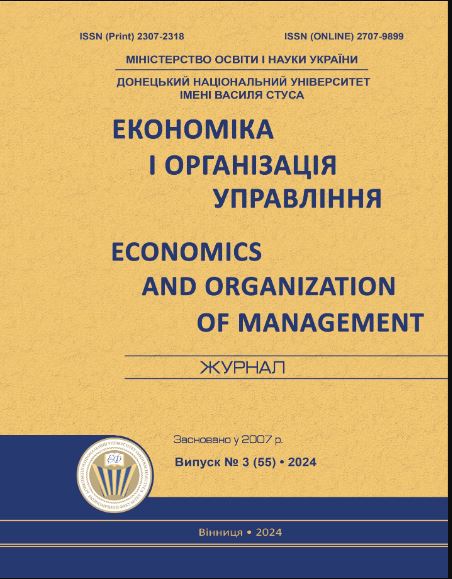Аналіз стратегій трансформаційних змін міжнародних нафтогазовидобувних компаній у контексті декарбонізації
DOI:
https://doi.org/10.31558/2307-2318.2024.3.10Ключові слова:
декарбонізація, стратегія, нафтогазова компанія, енергетичний сектор, сталий розвитокАнотація
У даній роботі проаналізовано стратегії трансформаційних змін великих міжнародних нафтогазовидобувних компаній в контексті декарбонізації, які є ключовим елементом для забезпечення стійкості та конкурентоспроможності галузі в умовах глобальної зміни клімату. Сучасний енергетичний сектор стикається зі значними викликами, спричиненими необхідністю зниження викидів вуглекислого газу та переходу до більш екологічно чистих джерел енергії. Міжнародні нафтогазові компанії, які історично залежали від викопного палива, зобов'язані адаптувати свої бізнес-моделі та виробничі процеси для відповідності новим екологічним стандартам та соціальним очікуванням.
Виконано порівняння стратегій трансформаційних змін трьох міжнародних нафтогазовидобувних компаній (Saudi Aramco, ExxonMobil, Shell) у контексті декарбонізації, виділено переваги та недоліки кожної із стратегій. Пропонується враховувати досвід провідних світових компаній при складанні планів з декарбонізації для українських нафтогазовидобувних підприємств.
Однією з ключових причин важливості трансформаційних змін є необхідність відповідності глобальним цілям декарбонізації, закріплених Паризькою угодою 2015 року. Це означає, що нафтогазові компанії повинні істотно скоротити свої викиди парникових газів, що вимагає докорінних змін в управлінні активами та технологічних підходах до видобутку і переробки викопних видів ресурсів. Компанії, які не зможуть адаптуватися до цих змін, ризикують втратити позиції на ринку, зіткнутися зі зниженням інвестиційної привабливості та регуляторними санкціями.
Інший важливий аспект трансформаційних змін пов'язаний з розвитком нових напрямів бізнесу, таких як відновлювані джерела енергії та низьковуглецеві технології. Стратегії декарбонізації включають диверсифікацію портфеля активів, інвестиції в "зелену" енергетику, а також розвиток інноваційних рішень для захоплення і зберігання вуглекислого газу. Міжнародні компанії вже запроваджують амбітні програми щодо зниження вуглецевого сліду та збільшення інвестицій у відновлювану енергетику, тим самим сприяючи підвищенню стійкості до довгострокових кліматичних ризиків.
Також важливою є соціальна складова трансформаційних змін. Під впливом зростаючого тиску з боку інвесторів, державних органів і громадськості нафтогазові компанії змушені демонструвати екологічну відповідальність і прозорість. Реалізація стратегій сталого розвитку дозволяє компаніям не тільки зберігати соціальне схвалення на ведення бізнесу, але й підвищувати довіру з боку суспільства. Це, в свою чергу, сприяє залученню нових інвестицій та розвитку партнерських відносин з екологічно орієнтованими гравцями.
Посилання
Владиченко, В. В., Замулко, А. І. (2022). Інтеграція відновлюваної енергетики в газовій промисловості. Збірник матеріалів конференції: Енергетичний менеджмент: стан та перспективи розвитку–PEMS, 54-58.
Гринюк, О. (2022). Ідентифікація ризиків декарбонізації нафтогазової галузі. Вісник Хмельницького національного університету, (4), 185-191.
Гуня, Д. П. (2021). Можливі причини зміни клімату та необхідності декарбонізації енергетики. Гiрнича геологiя та геоекологiя, (2 (3)), 65-74.
Кузнецова, М. О. (2021). Декарбонізація як пріоритет сталого розвитку енергетичного підприємства. Економіка та держава, (1), 171-174.
Максимова І. (2024). Декарбонізація світової промисловості. Foreign trade: economics, finance, law, 135(4), 38-51.
Паневник, О. В. (2021). Аналіз процесів інтеграції технологій відновлюваної енергетики в нафтогазову промисловість. Prospecting and Development of Oil and Gas Fields, (4 (81)), 7-15.
Aramco Sustainability Report 2023. URL: https://www.aramco.com/-/media/publications/corporate-reports/sustainability-reports/report-2023/english/2023-saudi-aramco-sustainability-report-full-en.pdf (Дата посилання: 03.10.2024)
Blazquez, J., Dale, S., Jefferiss, P., Heffron, R. J., Herbertson, J., West, R., Hegland, J. (2020). Decarbonization pathways for oil and gas. In Oxford Energy Forum Vol. 121, pp. 1-40.
Exxon Mobile Sustainability Report. URL: https://corporate.exxonmobil.com/-/media/global/files/sustainability-report/publication/sustainability-report.pdf (Дата посилання: 03.10.2024)
Green, J., Hadden, J., Hale, T., Mahdavi, P. (2022). Transition, hedge, or resist? Understanding political and economic behavior toward decarbonization in the oil and gas industry. Review of international political economy, 29(6), 2036-2063.
Shell Sustainability Report 2023. URL: https://reports.shell.com/sustainability-report/2023/services/downloads.html (Дата посилання: 03.10.2024)

